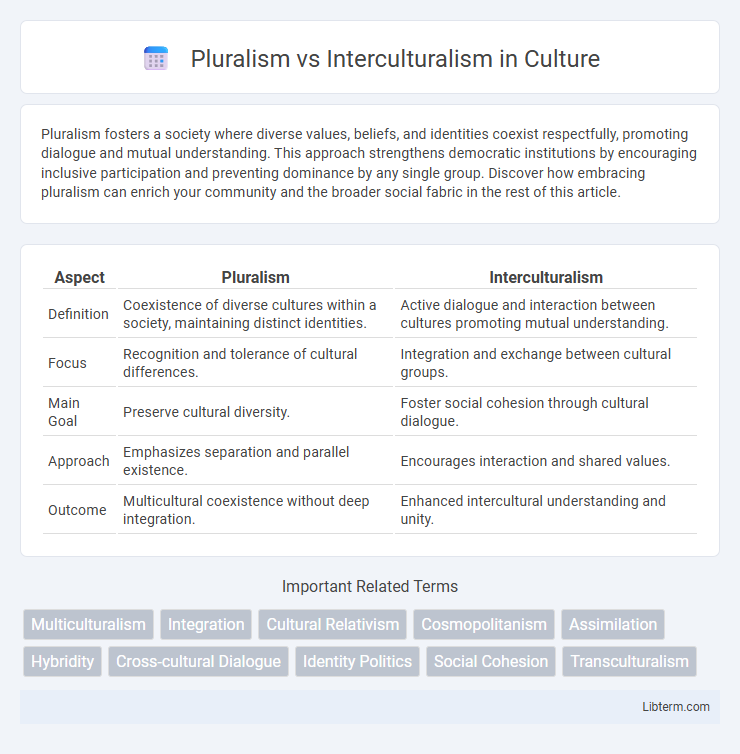Pluralism fosters a society where diverse values, beliefs, and identities coexist respectfully, promoting dialogue and mutual understanding. This approach strengthens democratic institutions by encouraging inclusive participation and preventing dominance by any single group. Discover how embracing pluralism can enrich your community and the broader social fabric in the rest of this article.
Table of Comparison
| Aspect | Pluralism | Interculturalism |
|---|---|---|
| Definition | Coexistence of diverse cultures within a society, maintaining distinct identities. | Active dialogue and interaction between cultures promoting mutual understanding. |
| Focus | Recognition and tolerance of cultural differences. | Integration and exchange between cultural groups. |
| Main Goal | Preserve cultural diversity. | Foster social cohesion through cultural dialogue. |
| Approach | Emphasizes separation and parallel existence. | Encourages interaction and shared values. |
| Outcome | Multicultural coexistence without deep integration. | Enhanced intercultural understanding and unity. |
Defining Pluralism and Interculturalism
Pluralism emphasizes the coexistence of diverse cultural, religious, and ethnic groups within a society, maintaining distinct identities while promoting mutual respect. Interculturalism focuses on fostering active dialogue and interaction between these groups to encourage integration and shared understanding. Both frameworks address diversity but differ in approach: pluralism values separation with respect, whereas interculturalism prioritizes connection and exchange.
Historical Roots of Pluralism
The historical roots of pluralism trace back to ancient political and philosophical systems that embraced diversity within governance, such as the Athenian democracy and the Roman Republic. Philosophers like John Locke and John Stuart Mill further developed pluralist thought by advocating individual rights and toleration amidst differing views in society. Pluralism emerged as a response to the complexities of modern nation-states managing cultural, religious, and ethnic diversity without enforcing assimilation.
Evolution of Interculturalism
Interculturalism has evolved as a dynamic framework emphasizing active dialogue and mutual transformation between cultures, contrasting with pluralism's focus on coexistence without significant interaction. Originating in Quebec in the early 2000s, interculturalism promotes integration through shared values while respecting diversity, aiming to address critiques of pluralism's perceived cultural segregation. This evolution reflects a shift towards policies that encourage social cohesion, inclusive participation, and the negotiation of cultural differences in increasingly multicultural societies.
Core Principles of Pluralism
Pluralism emphasizes the coexistence and mutual respect of diverse cultural, religious, and ethnic groups within a society, advocating for the acknowledgment and preservation of distinct identities. Its core principles include equality, recognition of difference, and the promotion of inclusive dialogue to foster understanding and cooperation among groups. Pluralism actively supports institutional frameworks that protect minority rights and prevent cultural assimilation, ensuring equitable participation in social, political, and economic life.
Key Features of Interculturalism
Interculturalism emphasizes active engagement, dialogue, and interaction between diverse cultural groups within a society to foster mutual understanding and social cohesion. It promotes shared values and common public spaces while respecting cultural differences, encouraging integration without assimilation or segregation. Key features include dynamic cultural exchanges, inclusive policies, and a focus on equality and social justice to create harmonious coexistence.
Comparative Analysis: Pluralism vs Interculturalism
Pluralism emphasizes coexistence of diverse cultural groups within a society by recognizing and respecting distinct identities without requiring integration, whereas interculturalism advocates active interaction and dialogue among cultures to foster mutual understanding and social cohesion. Pluralism supports parallel cultural expressions, maintaining boundaries between groups, while interculturalism promotes shared values and collaborative exchanges to bridge differences. This comparative analysis reveals pluralism's focus on tolerance and preservation, contrasting with interculturalism's pursuit of dynamic engagement and integration.
Impact on Policy and Governance
Pluralism emphasizes managing diversity through policies that promote recognition of distinct cultural groups, influencing governance by encouraging group-specific rights and representation. Interculturalism advocates for dialogue and interaction among cultures, shaping policy to foster social cohesion and mutual understanding within a shared public space. Both approaches impact governance frameworks by navigating the balance between cultural difference and societal unity in multicultural states.
Social Integration and Community Dynamics
Pluralism promotes social integration by encouraging coexistence of diverse cultural groups while preserving distinct identities, fostering mutual respect within communities. Interculturalism emphasizes active interaction and dialogue among cultural groups, aiming to build shared values and collective identity to strengthen social cohesion. Both frameworks influence community dynamics by shaping policies that balance cultural recognition with inclusive participation in social life.
Criticisms and Challenges
Pluralism faces criticism for creating fragmented societies where groups remain isolated, limiting genuine social cohesion and mutual understanding. Interculturalism challenges include the risk of oversimplifying cultural differences and imposing dominant cultural norms under the guise of dialogue. Both frameworks struggle with addressing power imbalances and ensuring equitable participation from marginalized communities.
The Future of Multicultural Societies
Pluralism emphasizes the coexistence of diverse cultural identities within a society, promoting equal recognition and respect for all groups, while interculturalism stresses active dialogue and interaction between cultures to foster social cohesion. The future of multicultural societies hinges on balancing these approaches, ensuring both the preservation of cultural distinctiveness and meaningful integration through mutual understanding. Policies encouraging intercultural communication alongside pluralistic rights can create resilient, inclusive communities adapted to global demographic shifts.
Pluralism Infographic

 libterm.com
libterm.com